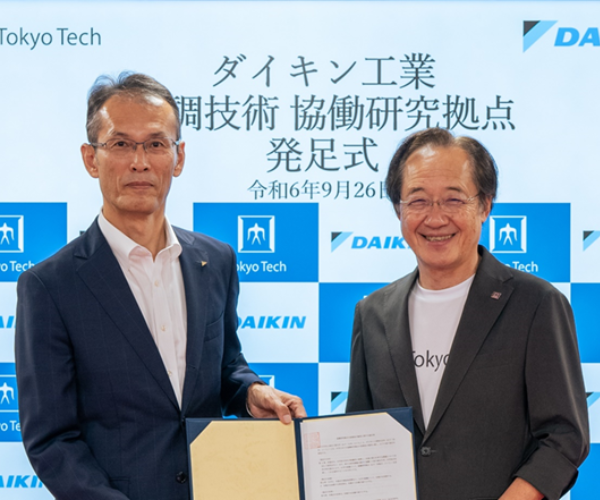September 27, 2024
Daikin Industries, Ltd.
Tokyo Institute of Technology
TOKYO, Japan, September 27, 2024- Daikin Industries, Ltd. (Representative Director, President and COO: Naofumi Takenaka; hereinafter referred to as “Daikin”) and Tokyo Institute of Technology (President: Kazuya Masu; hereinafter referred to as “Tokyo Tech”, currently Institute of Science Tokyo) have established the “Daikin Air Conditioning Technology Collaborative Research Cluster” at Tokyo Tech, the site where the two organizations will conduct joint research for the advancement of core air conditioning technologies.

(From left) Daikin Senior Executive Officer Yuji Yoneda and Tokyo Tech President Kazuya Masu
Accompanying the economic development and population growth in emerging countries, the International Energy Agency (IEA) projects global electricity demand for air conditioning (cooling) to triple by 2050. This increased demand for air conditioners is expected to have a significant effect on climate change and boost demand for the widespread use of air conditioners with improved energy efficiency to help mitigate the environmental impact.
An air conditioner compressor, which is considered the heart of the air conditioner, accounts for the greater part of the electricity consumed by air conditioners. To improve energy efficiency in air conditioners and achieve carbon neutrality by 2050, the air conditioning industry faces the important challenge of making further advances in compressors along with the motors and inverters that support their efficient operation. Digital transformation in compressor development, including the use of more advanced analysis technologies, is vital for both reducing the labor hours and costs involved with compressor development and improving quality.
For many years, Tokyo Tech and Daikin have been conducting joint research related to improving motors used in large-sized air conditioners. Leveraging the scientific knowledge and research resources of Tokyo Tech for compressors, motors, and inverters, the core technologies of air conditioning, this collaborative research cluster means to apply and adopt those technologies to air conditioners and contribute to the realization of a carbon neutral society.
※On October 1, 2024, Tokyo Medical and Dental University and Tokyo Institute of Technology merged to become Institute of Science Tokyo.
■Summary of the Daikin Air Conditioning Technology Collaborative Research Cluster
Name: Tokyo Tech Open Innovation Platform Collaborative Research Cluster: Daikin Air Conditioning Technology Collaborative Research Cluster
Location: Tokyo Institute of Technology
Establishment: September 13, 2024, to March 31, 2029
Cluster Director: Akira Chiba (Professor, Department of Electrical and Electronic Engineering, School of Engineering, Tokyo Institute of Technology)
Associate Cluster Director: Naoto Kobayashi (Senior Manager in Charge of Technology Strategy, Technology and Innovation Center, Daikin Industries, Ltd.)
■About the Collaborative Research Cluster of Tokyo Tech
Tokyo Tech works together with companies to set up research planning teams to develop new research themes and conduct joint research. The activities of the collaborative research cluster are supported by Tokyo Tech's Open Innovation Platform.
■About the Open Innovation Platform of Tokyo Tech
The Open Innovation Platform is a system for large-scale research activities centered primarily in the fields of energy and materials, which are strengths of Tokyo Tech, and in the fields of mechanics and biotechnology, which are additional areas of focus for the institute. The Tokyo Tech Open Innovation Platform Collaborative Research Cluster was established in collaboration between Tokyo Tech and a variety of companies. Under the leadership of Osamu Watanabe, Executive Vice-President, together with the decision-making of Kaoru Kuwata, Executive Vice-President and Director of the Open Innovation Platform, and Yoichi Oshima, Vice-President, Professor, and Associate Director/General Creative Manager (GCM) of the Open Innovation Platform, systems have been established to rapidly promote and support the large-scale collaborative activities.